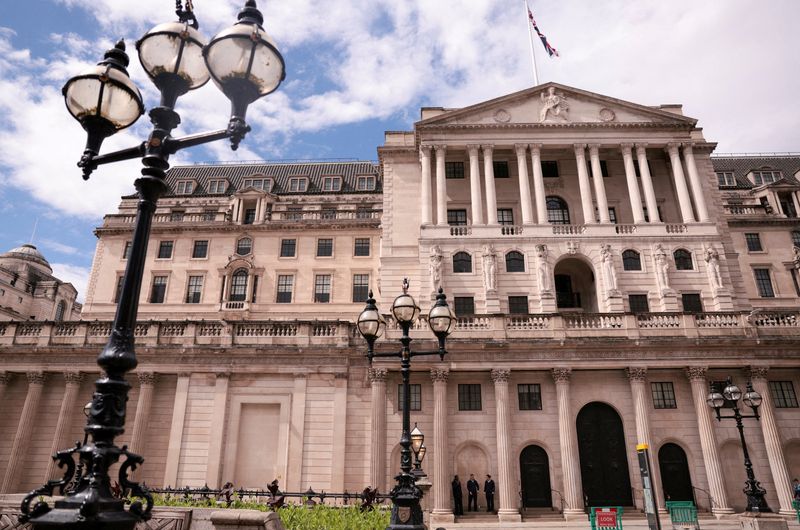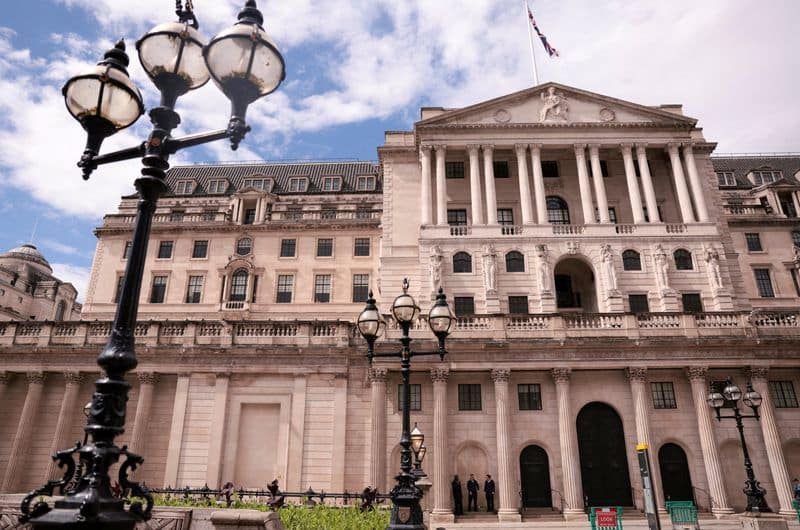By David Milliken
LONDON (Reuters) -The Bank of England said on Monday that banks should get ready to make greater use of its repo facilities as it sells down its government bond holdings, and that it plans a major expansion of its current six-month repo operation.
Repos, or repurchase agreements, allow banks to temporarily swap bonds and other collateral they own for cash from the central bank, helping to keep market interest rates in line with the bank’s policy rate.
“The point at which the banking system will actively need to obtain reserves, including directly from the Bank’s repo operations is now firmly in sight,” the BoE’s Executive Director for Markets, Victoria Saporta, said in a speech in London to the Association for Financial Markets in Europe.
Britain’s central bank is reducing at a pace of 100 billion pounds ($129 billion) a year its holdings of government bonds, which it bought between 2009 and 2021 as part of its quantitative easing stimulus.
This drains cash from the financial system, potentially putting unwanted upward pressure on overnight interest rates.
Adding further pressure is the end of a separate BoE scheme which offered banks cheap credit to lend to small businesses during the COVID-19 pandemic.
Cash reserves held by banks at the BoE currently total just over 765 billion pounds. In May, BoE Governor Andrew Bailey said they would need to fall to between 345 billion and 490 billion pounds to put significant upward pressure on interest rates, based on a financial market survey.
Saporta said she expected sterling overnight interbank interest rates, which currently stand at 5.20%, to converge towards the BoE’s 5.25% policy rate as reserves approached the minimum level banks wanted to hold.
Estimates for this level were inherently uncertain and it could be hit as soon as next year, she said.
“It’s important therefore that our facilities are robust to this uncertainty, and that firms step up their preparations to ensure they are ready to use them sooner rather than later.”
Not all banks had registered to take part in BoE repos and others needed advance approval for their collateral, she said.
RECORD REPO USAGE
Last week the BoE’s Short-Term Repo had a record jump in usage to 29 billion pounds.
Saporta said the greater use was welcome, reflecting banks’ increased familiarity with the Short-Term Repo and the cost-effectiveness of rolling over weekly financing.
The BoE also aims to massively increase usage of its Indexed Long-Term Repo facility. This offers cash for six months and accepts a wider range of collateral than the Short-Term Repo but is barely used by banks at present.
The Indexed Long-Term Repo charges banks a higher interest rate than the Short-Term Repo for some of its lending.
In a chart presented by Saporta, the longer-term repo was shown accounting for the vast bulk of central bank reserves by the end of the decade if the BoE continued to unwind its QE bond portfolio, which peaked at 875 billion pounds in 2021.
“We are currently reviewing the calibration of the ILTR to ensure it can play this role effectively. We will be engaging with the market later this year on this,” Saporta said.

The BoE’s Monetary Policy Committee will conduct an annual review of the pace of bond sales at its September meeting.
($1 = 0.7736 pounds)

